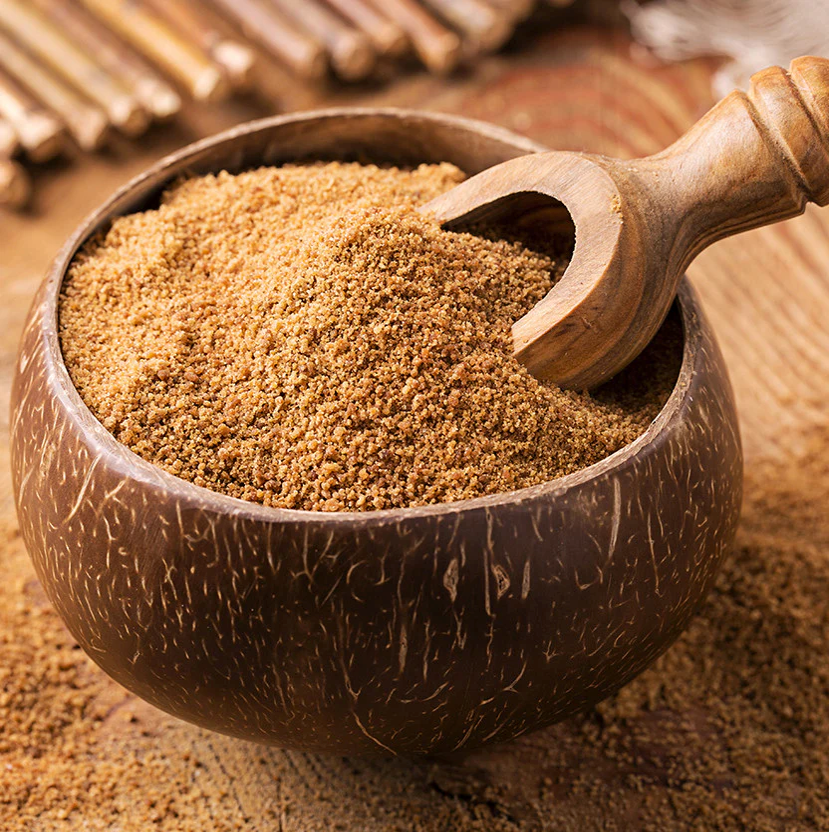
Palm sugar is a traditional ingredient in Indonesian and Southeast Asian cuisine. The brown-colored sugar offers the same sweetness with the depth of caramel and a hint of coconut. Because of its lower glycemic index, it is a superior alternative to white, cane sugar.
Palm sugar, also known as coconut sugar, is a natural sweetener that has been used in traditional Asian cuisine for centuries. It is made from the sap of various species of palm trees, including the coconut palm, and is produced mainly in Southeast Asia.
The production of palm sugar begins with the tapping of the palm tree to extract the sap. The sap is collected in bamboo containers and boiled down to a thick syrup. The syrup is then poured into molds made from coconut shells or bamboo and left to cool and solidify. The resulting palm sugar is a dark, caramel-colored block with a rich, earthy flavor.
One of the main benefits of palm sugar is that it is a low glycemic index (GI) sweetener. This means that it does not cause a rapid spike in blood sugar levels, making it a suitable option for people with diabetes or those looking to manage their blood sugar levels. In addition, palm sugar is also high in nutrients, including potassium, magnesium, and zinc, making it a healthier alternative to refined sugar.
Palm sugar is a versatile ingredient that can be used in a variety of dishes, from sweet to savory. In Southeast Asia, it is often used in desserts such as kueh and ondeh-ondeh, as well as in curries and stir-fries. In India, palm sugar is used to sweeten traditional beverages such as masala chai, while in Indonesia, it is used to make a sweet, caramel-like sauce called kecap manis.
Despite its health benefits and versatility, palm sugar is not as widely available as other sweeteners such as cane sugar or honey. However, there has been a growing demand for palm sugar in recent years, driven in part by the increasing popularity of natural and organic foods.
The production of palm sugar is also an important source of income for many small-scale farmers in Southeast Asia. The tapping and collection of palm sap is a labor-intensive process, and many farmers rely on palm sugar production as a primary source of income. In addition, the production of palm sugar is a sustainable practice that does not require the use of harmful pesticides or chemicals, making it an environmentally friendly option.
However, there are also concerns about the sustainability of palm sugar production, particularly in light of the increasing demand for palm oil. The expansion of palm oil plantations has led to the destruction of natural habitats and the displacement of indigenous communities in Southeast Asia. As a result, some consumers are hesitant to support the palm sugar industry, fearing that their purchase may contribute to these negative impacts.
To address these concerns, there has been a growing movement towards sustainable palm sugar production. This includes initiatives such as the Roundtable on Sustainable Palm Oil (RSPO), which works to promote sustainable palm oil and palm sugar production. Additionally, some companies have begun to source palm sugar from small-scale farmers and cooperatives that practice sustainable farming methods and prioritize environmental and social responsibility.
In conclusion, palm sugar is a unique and flavorful sweetener that has been used in traditional Asian cuisine for centuries. While it has many health benefits and is an important source of income for many small-scale farmers, there are also concerns about the sustainability of its production. By supporting sustainable palm sugar initiatives and purchasing from responsible sources, consumers can help ensure that palm sugar remains a viable and sustainable option for years to come.